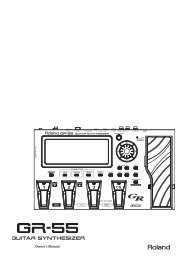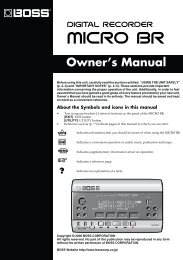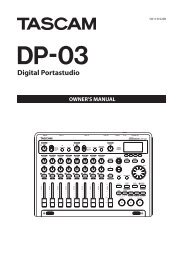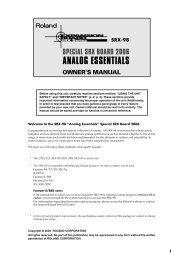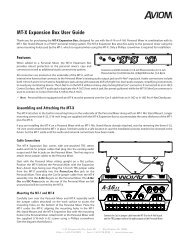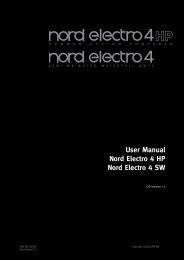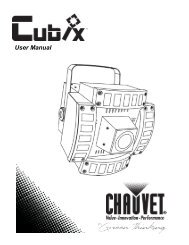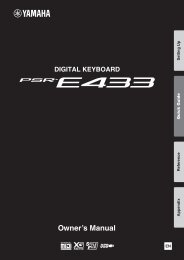SCS.1d - Stanton
SCS.1d - Stanton
SCS.1d - Stanton
You also want an ePaper? Increase the reach of your titles
YUMPU automatically turns print PDFs into web optimized ePapers that Google loves.
DaRouter - <strong>SCS.1d</strong> Options<br />
Now, if you click the <strong>SCS.1d</strong> Options button the <strong>SCS.1d</strong> Control Panel will<br />
open, so you will be able to change the Scratch Engage, the Scratch<br />
Release, and Pitch Bend Sensitivity values. (Figure 5.5)<br />
Scratch Engage Sensitivity – The <strong>SCS.1d</strong> uses an algorithm to detect<br />
scratching to accommodate MIDI scratching implementation in host<br />
applications such as Traktor. The Scratch Engage slider will set how quickly<br />
the scratch algorithm will detect that you are trying to perform a scratch.<br />
Higher settings will make the algorithm more snappy. However, if you set<br />
this value too high you run the risk of mistriggering a scratch message<br />
with the slightest variance in record speed.<br />
Scratch Release Sensitivity – This slider controls how quickly the <strong>SCS.1d</strong><br />
will detect the record being released and catching up to speed with the<br />
platter thus entering regular playback mode and disabling scratching in<br />
the host application.<br />
Figure 5.5<br />
Pitch Bend Sensitivity – The <strong>SCS.1d</strong> also has the ability to detect when<br />
the platter is being rubbed manually by hand to slow or speed the track<br />
up. This is detected when the platter and record change speed at the same<br />
time (whereas with scratching the platter keeps spinning at its set speed).<br />
Setting this value will change the sensitivity and once again, making it too<br />
sensitive might cause mistriggers of the pitch bend message going to the<br />
host application.<br />
5.2.3 Section C<br />
Activity Monitor<br />
The activity monitor indicates messages flowing in and out of DaRouter.<br />
The first arrow indicates an incoming message. The DaRouter icon<br />
indicates a translation occurring, and the last arrow indicates an<br />
outgoing message. The images will glow blue to indicate they are<br />
processing an action.<br />
Logos<br />
Just for bling... actually, they do link to websites.<br />
Version<br />
This displays the current version of DaRouter. (Figure 5.6)<br />
Figure 5.6<br />
27



